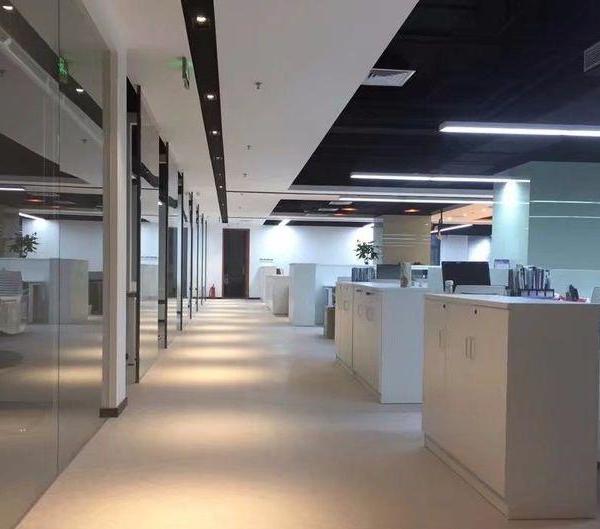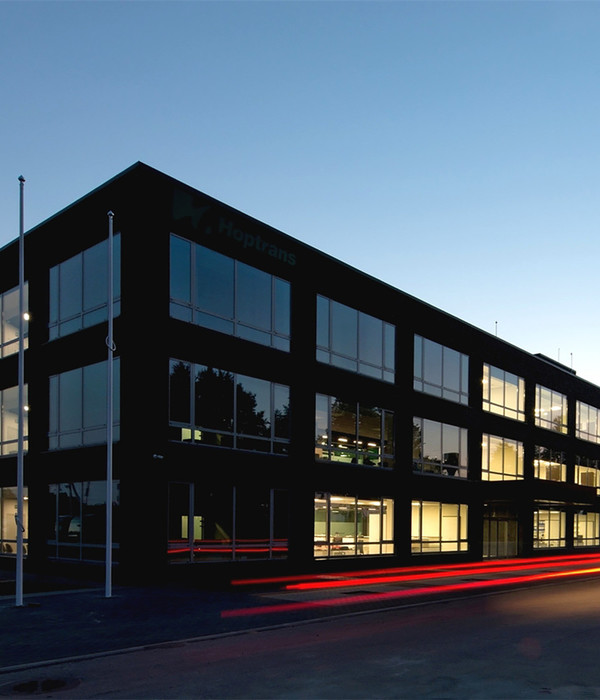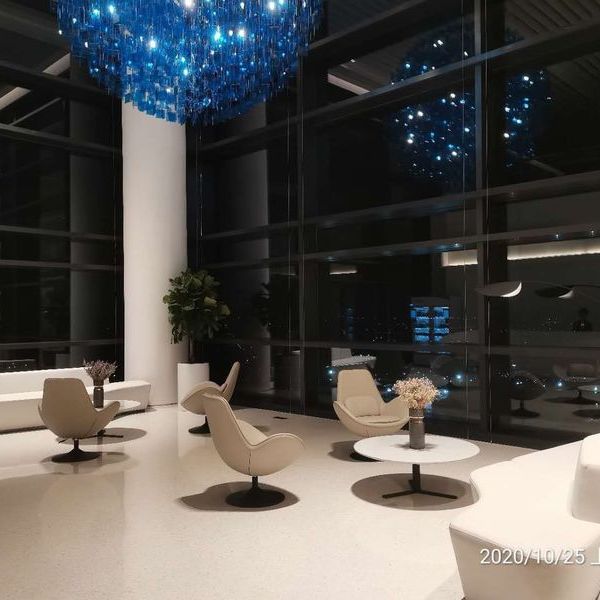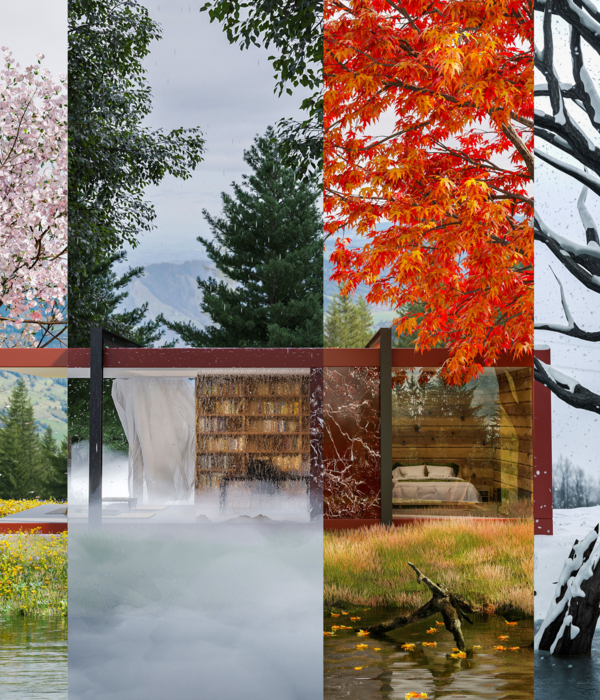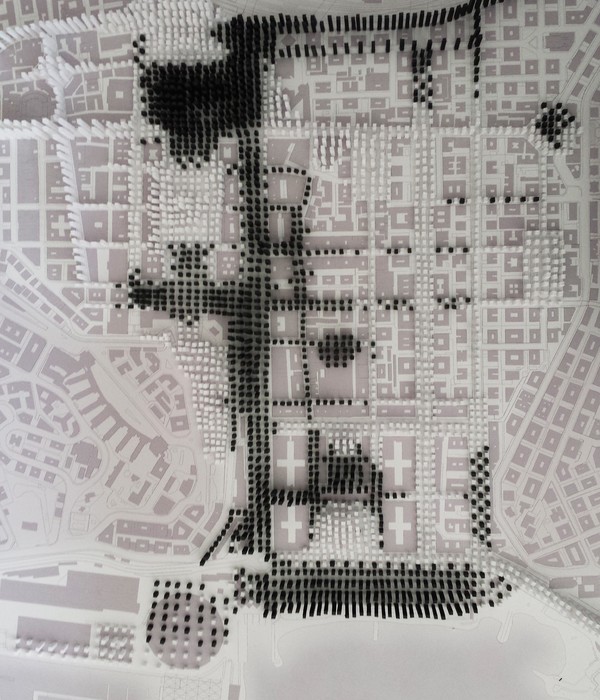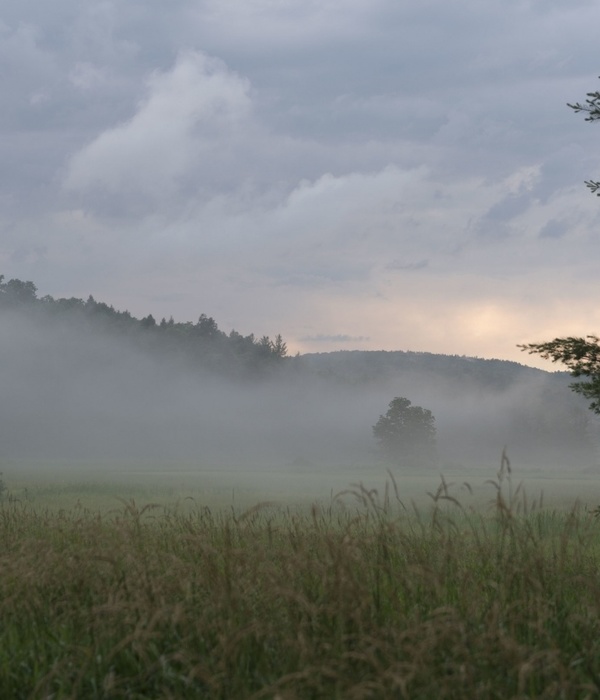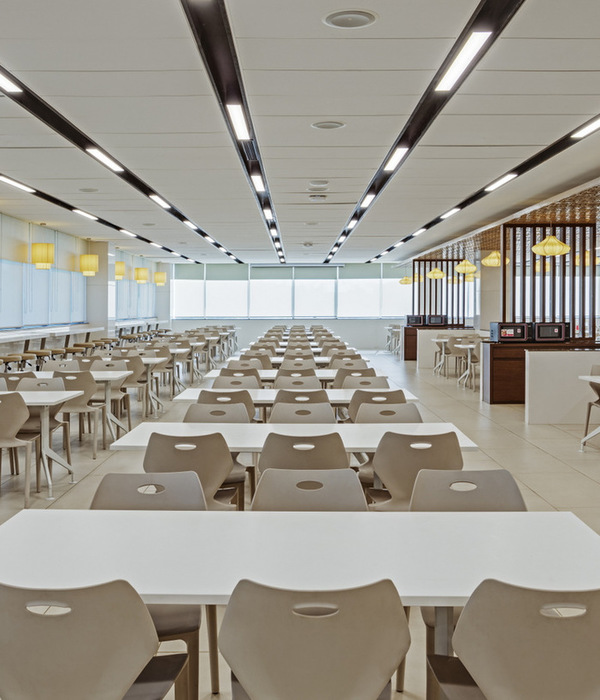- 项目名称:广州网易总部
- 设计方:广州市东意建筑设计咨询有限公司
- 建筑面积:56000 ㎡
- 客户:广州博冠信息科技有限公司
- 项目地址:广东省广州市天河区思蕴路3号
The project sits in a relatively discrete downland in the cul-de-sac of Tianhe Software Park, Guangzhou, hemmed in this horseshoe-shaped massif with a beautiful natural landscape, fronting a lake and set against the hill. Variation in topographic height being significant, the construction land is narrow and irregularly shaped. Building height is set under 20 meters, as required by urban planning, with a respect for circumferential hilly mass. Interestingly, the design team was involved in urban-planning this area years ago and determining the height limit, which now challenges them as an architectural constraint.
▼项目鸟瞰,Project Aerial View ©陈中
周边自然环境的特质决定了设计策略。设计将建筑切分成若干个方正的功能体量,沿用地摆开,“镶嵌”在绿色的山体环境中;体量之间采用通透的连接处理,如同铰链般消解用地曲折带来的布局问题,并使建筑融入自然环境。
The design complies with the identity of the surrounding natural environment by dividing the architecture into several square functional masses, spread out along the site and “enchased” in the green hilly setting. Different buildings are connected via see-through interspaces, as if using hinges to resolve the disconnectivity in the topographic tortuousness, helping the architecture blend in the natural environ.
▼建筑体量轴测示意图,Isometric Schematics of Architectural Mass ©东意建筑
▼建筑功能体量与通透连接,Function-based Architectural Masses and See-through Interspace ©陈中
建筑造型设计富于实体感,如巨石般的强烈体积感既与山体及湖面形成合理的对比关系,又满足了室内环境的控光需求。
The architectural style exudes a highlighted physical presence, where an accentuated volume, akin to a boulder, contrasts comfortably with the hill and lake, while offering the desired indoor lighting.
建筑造型与周边环境
建筑体的连接部位设置为“服务性”功能——入口、卫生间、交通核心以及室外楼梯等,使之成为使用者必经的空间;并采用“立体园林”的方式,引入阳光、绿化及丰富的景观体验,营造良好的公共交流空间。
The building connections are designed as “service” portals, ranging from entrances, restrooms, transport hubs and external staircases, the must-have passages for dwellers. An “all-dimensional garden” approach is adopted, enabling a cheerful public space by introducing sunlight, greenery and expansive landscape in line of sight.
▼建筑体连接部位及主入口,Building Connections and Main Entrance ©陈中
立体园林的连接空间,connection space like an all-dimensional garden ©陈中
▼从连接部分看向外部环境,view to the environment from the Vestibule ©陈中
用地的东侧、北侧布置两栋主体办公楼,以首层的咖啡厅相连。西侧布置食堂、体育运动设施等服务功能,并在中心湖设置廊桥与办公楼连接。该策略在于鼓励IT从业者改变久坐办公的状态,在休憩、用餐或运动时,步行通过开放的平台、楼梯、廊桥,享受园区优质的环境。
Two main office buildings are placed along the east and north of the site, connected by the ground-floor cafeteria. Staff canteen and gym can be found on the west, while access to the office buildings from the central lake is realized by a covered bridge. This design encourages IT workers to refrain from sedentary work and instead, during recess, dining or workout, walk through the open terraces, staircases and covered bridge and savor the gardenly ambience.
连接主体建筑和办公楼的连廊,bridge connecting the main building and the office building ©陈中
▼中心湖景观廊桥,Covered Bridge with a View of Central Lake ©陈中
观景阳台,Veranda©陈中
室内空间采用较为粗犷的处理方式,柱体、梁、天花为素混凝土面,机电系统在天花下灵活布置,会议室等密闭空间采用独立盒体的方式植入;充分考虑了办公空间的灵活性以应对发展变化。
Interior space is managed with a rugged stroke, with unadorned, concrete-only columns, beams and ceilings, giving a free rein to the electromechanical system in its layout. Closed spaces, like conference rooms, are implanted as standalone boxes, a measure of adaptive readiness with spatial flexibility.
▼办公空间,Office Space ©陈中
设计将原有自然水体扩大,形成几个连续的不同标高湖面,可汇集场地及山体的雨水。建筑体量面向开阔水面布置,利用地形风环境促进自然通风。半地下停车空间利用地形高差解决了自然采光通风,并创造了建筑形态上的悬浮感。
The original natural waters are expanded on purpose to create several lake surfaces with continuously rising elevation, capable of concentrating precipitation of the site and hills. The building mass is set facing the open water, generating natural ventilation via local environmental wind. The semi-underground Parking lot leverages the topographic height variation for natural lighting and ventilation, with the throw-in benefit of a suspended architectural form.
▼景观湖全景,Panoramic View of Landscape Lake ©陈中
▼湖岸生态,Lakeside Environs ©陈中
夜景,Night scape ©陈中
▼总平面图,Site Plan ©东意建筑
▼A楼一层平面图,Ground Floor Plan of Building A ©东意建筑
▼C楼一层平面图,Ground Floor Plan of Building C ©东意建筑
▼D楼一层平面图,Ground Floor Plan of Building D ©东意建筑
▼A楼立面图,Elevation of Building A ©东意建筑
▼C楼立面图,Elevation of Building C ©东意建筑
▼D楼立面图,Elevation of Building D ©东意建筑
项目名称:广州网易总部
设计方:广州市东意建筑设计咨询有限公司
项目设计&完成年份:2014-2019
主创及设计团队:肖毅强、刘穗杰、邹艳婷、黄立思、张泽礼、黄瑾、陈达文、苏竟、谢子滢、郑泽旭、李根明、梁启立、林颖佳、惠星宇
项目地址:广东省广州市天河区思蕴路3号
建筑面积:56000 ㎡
摄影版权:陈中
合作方:广东省华城建筑设计有限公司
客户:广州博冠信息科技有限公司
Project Name: NetEase Guangzhou Headquarters
Design: Atelier Y
Design & Completion Year: 2014-2019
Leader Designer & Team: XIAO Yiqiang, LIU Suijie, ZOU Yanting, HUANG Lisi, ZHANG Zeli, HUANG Jin, CHEN Dawen, SU Jing, XIE Ziying, ZHENG Zexu, LI Genming, LIANG Qili, LIN Yingjia, HUI Xingyu
Project Location: Tianhe District, Guangzhou
Gross Built Area: 56000 ㎡
Photo Credits: CHEN Zhong
Partners: Guangdong Huacheng Architectural Design Firm Limited
Clients: Guangzhou boguan Information Technology Firm Limited
{{item.text_origin}}

